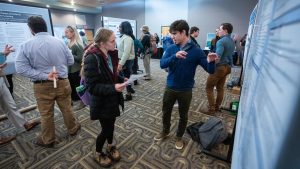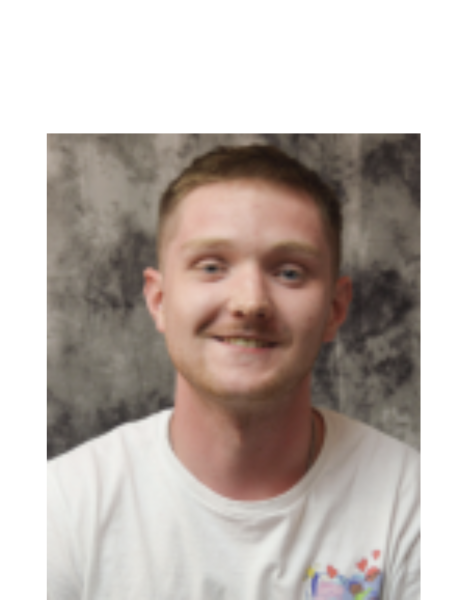UWO highlights student research
May 4, 2022
With the school year winding down, it’s tempting to call it quits early and begin thinking about summer plans. But research at UW Oshkosh is still in full swing, with the Celebration of Scholarship and Creative Activity (COSCA) event last week highlighting the esteemed research completed by students.
COSCA is an annual event that shows off students’ research in various areas of study. The research is presented via posters, paintings, pictures or performative visuals, with most presentations being a collaboration between students and professors. From ecology and wildlife to virology and culture, each study sheds light on new and carefully analyzed information.
Rachel Blatz and Hannah Sullivan, for example, investigated whether body mass index is a valid predictor of specific fitness assessments. Blatz and Sullivan monitored a group of 11- to 13-year-olds, who participated in a one-mile run/walk, push-up and sit-up flexibility tests. They determined that activity-based assessments, such as running tests, are the best indicators of physical fitness.

The Celebration of Scholarship and Creative Activity highlighted students’ research in various areas of study. Visitors were able to stop in to learn about their projects.
Sarah Woody’s presentation, titled “Heavy Metal and Metalloid Risk Assessment at Horicon National Wildlife Refuge,” observed the impact of pollution at Horicon National Wildlife Refuge, an ecologically relevant wetland located in southeastern Wisconsin. Woody said that she began collecting samples of sediment, plant roots and livers from muskrats in March of 2021.
“Over the summer, I analyzed these samples for concentrations of the top eight heavy metal and metalloid contaminants in U.S. soils,” Woody said. Her analysis concluded that concentrations of polluting metals in the environment were insufficient to affect organisms such as plants and animals.
Woody says that her adviser had professional connections with land managers at Horicon National Wildlife Refuge and that she had talked about conducting research with other students.
“From there, it was brainstorm[ing] with [my adviser] and the refuge’s staff to come up with a project that would be helpful for the refuge, and that would challenge me to step out of my comfort zone and grow as an independent researcher.”
Mackenzie Seymour researched the effects of cold temperature trials on native prairie plant seed germination to determine their cold tolerance levels. “We conducted a series of trials that included exposing seeds of various plant species to a range of cold temperatures. After the temperature trials, we monitored seed germination for two weeks,” Seymour said. “Extreme cold temperatures were damaging and impaired germination for the majority of the seeds. However, we concluded that there was no correlation between cold stratification [exposing seeds to their preferred conditions to grow] and [the seed’s] cold tolerance.”
“This type of research is important for understanding what kind of effects climate change may have on seed germination for native prairie plant species. Native prairies are important for preserving biodiversity and serve as habitats for wildlife,” Seymour said. She became a research assistant in the spring of 2021, hoping to narrow down her possible career paths. “I enjoy the work I do because I know I am contributing to the much-needed research on how climate change will affect seed germination and plant growth. It is essential for us to understand how plants are impacted by the effects of climate change so we can prepare to adapt.”
“I think universities like UW Oshkosh provide undergraduate students with a unique opportunity to work with professors in a way that’s not entirely possible at larger schools like UW-Madison,” said Stephen Kercher, director of UWO’s Office of Student Research and Creative Activity. “The attention that students get sets us apart, and we have so many good examples of students who take advantage of this opportunity and do great work.”
Both Seymour and Woody expressed their gratitude for the research opportunities they were provided. “I am extremely grateful for the immense amount of support and mentorship I received across departments at UWO,” Woody said. She explained that her research was entirely possible due to the help she received. “My adviser was my biggest cheerleader and always believed in me, providing reassurance when I had doubts. Throughout my experience, every professor I have reached out to for their expertise has been willing to help, and I have learned so much from them through our many stimulating academic discussions.”
Seymour shares a similar sentiment, saying that “I came in as a transfer student from out of state without knowing anybody and not knowing the amazing opportunities I would have in the coming semesters. I am fortunate and grateful to have had a multitude of research experiences during my undergraduate career, and it was all because of the great professors I had the privilege of working with.”
“The professors are very willing to undertake undergraduates in their lab to mentor them on how to become accomplished researchers,” Seymour said. “Without them, I wouldn’t have been able to have rewarding experiences that have made me appreciate the amount of effort and knowledge needed for the research process. Not only have the professors I’ve worked with guided and mentored me through the research process, but they have also inspired me to dive deeper into progressing further in the field of biology.”














